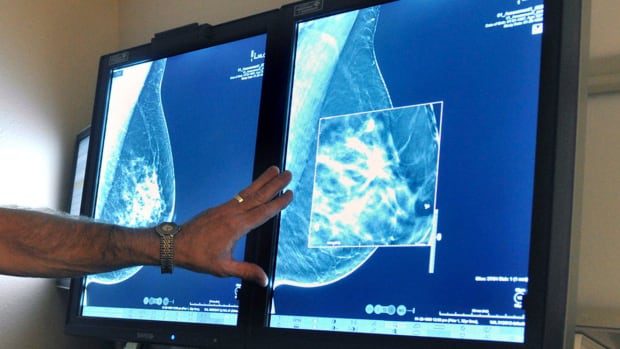Global Courant 2023-05-10 05:20:45
Doctors and breast cancer survivors are urging Canada to follow the example of a US task force and lower the recommended age for regular screening mammograms to 40 years.
The draft recommendation of the US Preventive Services Task Forcewhich was released Tuesday says “new and more inclusive science” has led it to demand screening mammograms every two years for women ages 40 to 74. Previously, screening for intermediate risk patients was recommended from the age of 50 years.
“This is the right move,” says Dr. Mojola Omole, a surgical oncologist at the Scarborough Health Network in Toronto.
She said she would like to see Canada go a step further than Americans, recommending annual screening starting at age 40, especially for black, Hispanic and Asian patients.
“We know that black women and Asian women actually have their peak incidence (of breast cancer) 10 years earlier than their white counterparts,” Omole said.
Dr. Mojola Omole, a surgical oncologist at the Scarborough Health Network in Toronto, says she would like to see annual screening mammograms starting at age 40. (Information Morning – NS with Portia Clark)
She noted that black women in particular are more likely to develop aggressive cancers at a younger age. They are also 40 percent more likely to die from breast cancer than white women, according to the US task force, which called for more research into how to better protect these patients.
Currently, in Canada, regular screening mammography is only recommended for patients between the ages of 50 and 74.
Screening guidelines vary across the country. Alberta has recently shifted to women as young as 45, and in some other provinces, women in their 40s are accepted if they are referred by a doctor or even through self-referral. But mammograms are only available to people over age 50 in Saskatchewan, Manitoba, Ontario, Quebec, and Newfoundland and Labrador.
Alberta patient Natalie Kwadrans said she wonders how her life would have changed if screening mammograms had been available for younger patients when she was diagnosed in 2019. She discovered a lump in her breast at age 46 and has been living with a terminal diagnosis of stage 4 cancer ever since.
“When I think about it, I’m a little angry because if the age had been 40 or even 45 … I would have gotten that cancer,” Kwadrans said.
“It’s a bitter pill to swallow that I was too young to get a mammogram.”
Risk of overdiagnosis and false positives
The current screening guidelines of the Canadian Task Force on Preventive Health Care date back to 2018. They are concerned about overdiagnosis when patients are screened at a younger age, leading to unnecessary treatment of cancer that would not have caused disease.
Dr. Guylène Thériault, co-chair of the task force, said patients should be aware of the risks of previous screening, including false positives.
“You need to be educated on the pros and cons and then decide for yourself with your values, your preferences, where you are in your life, whether screening is something worth doing, or something you’re going to give up,” she said.
However, Thériault added that the task force is looking into possible updates to the Canadian guidelines.
Canada’s current mammogram screening guidelines reflect concerns about overdiagnosis and false positives in younger patients. (Enrique Castro-Mendivil/Reuters)
Dr. Paula Gordon, a Vancouver oncologist and professor at the University of British Columbia, said concerns about false positives and overdiagnosis are overblown.
“Women don’t mind. They prefer to be screened and have the opportunity for early diagnosis,” she said.
“If you use that as a reason not to screen, you’re missing out on all those early cancers you could have found and lives you could have saved.”
Earlier detection means the cancer can be treated by removing the tumor, not the whole breast, and patients could be spared the punitive side effects of chemotherapy, Gordon said.
Dr. Paula Gordon, a Vancouver-based oncologist and professor at the University of British Columbia, says concerns about false positives and overdiagnosis with previous mammograms are overblown. (Doug Kerr/CBC)
She agreed with Omole’s call for annual screening for people in their 40s.
“The cancers in younger women tend to grow faster, and so you can’t leave two years between screenings,” Gordon said.
According to the Public Health Agency of Canada, one in eight Canadian women are expected to develop breast cancer and one in 33 will die from it.
Most cases of breast cancer — an estimated 83 percent — occur in people over the age of 50.




